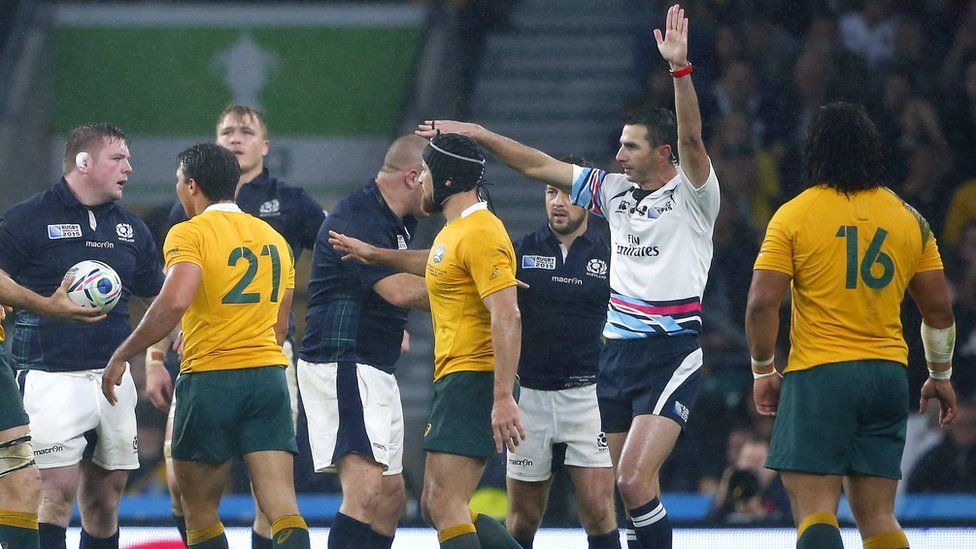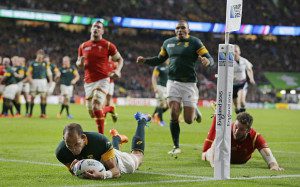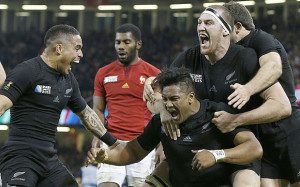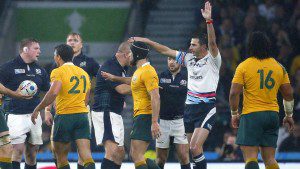
CASTRES, FRANCE – Heartbreak, euphoria, humiliation, tension, disbelief and despair – the Rugby World Cup quarter-finals wore all their emotions on their sleeves in a weekend that had tournament organisers breathing more easily than at any time since England’s ignominious and drawn-out departure became apparent with a match of the group stages to play.
New Zealand were irresistible, Argentina inspired, South Africa brutal. Australia were lucky. And here, at the business end of the Rugby World Cup, the northern hemisphere’s representatives had no answer.
So, as we head to all southern-hemisphere semi-finals for the first time in Rugby World Cup history, here’s the Rugby Wrap Up recap of the quarter-final weekend.
Rare Bok rapier thrust shatters Wales
South Africa 23 – 19 Wales
When it mattered, when they were a point down with just five minutes left on the quarter-final clock, South Africa departed from bludgeoning type to shatter Welsh hearts with a rapier rather than a sledgehammer.
Until then South Africa had played, as they had since JAPAN, with straightforward sledgehammer intent, but as the final whistle loomed, Duane Vermeulen ditched power to find Fourie Du Preez with magical sleight of hand.
It was as unexpected as it was successful. With Wales leading 19-18 and poised for only their third victory against the Springboks in 109 years, Vermeulen broke away down the blindside from a scrum near the Welsh 22, slipped a beauty of a pass out of the back of a giant hand and Du Preez was clear to score in the corner.
The 75 minutes leading up to Du Preez’s try was all about the forwards. The Springboks’ pack ramped up the might in the second half, but they were met by extraordinary Welsh defence – with captain Sam Warburton, in particular, outstanding. The final quarter was all about what happened when unstoppable Bok front eight met the immovable Welsh defence.

Fly-half Pollard set the foundations for the South African victory with 18 points from his boot, after a first-half try from scrum-half Gareth Davies and 14 points from Dan Biggar put Wales within touching distance of one of the biggest victories in their history.
The inspirational Biggar was forced to watch the last seven minutes from the sidelines after he was taken off for a head injury assessment.
Earlier, there had been shades of Wales’s loss to Australia as George North was dragged down short of the line. Then, they blew an overlap when Gethin Jenkins’ pass went over centre Tyler Morgan’s head and into touch.
But penalties as well as that rare late display of South African brilliance ultimately cost the Welsh. Referee Wayne Barnes punished a series of silly errors and Pollard made them pay.
France drown in nine-try rout
New Zealand 62 – 13 France
The post-mortem has begun. Hours after the French media stuck the knife deep into their badly wounded team – and twisted – outgoing coach Philippe Saint-Andre bemoaned the workload on his players compared to their All Black counterparts.
It’s an argument so old it has raced past ‘hoary’ and out the other side. Saint-Andre pointed out French internationals play up to 40 matches a year, compared to New Zealand internationals’ 25. His opposite number Steve Hansen then weighed in with the one about the number of overseas players in the Top 14 killing the French game because homegrown talent cannot develop. His point also took in the English Premiership and Pro12, but it’s a common complaint against the influx of foreign talent in the cash-rich French top flight.
This is not the place to discuss such weighty issues. They would take up lengthy posts of their own. Suffice to say that, as well as Saint-Andre who was on his way regardless, the fallout has unsurprisingly claimed Freddie Michalak and Pascal Pape, who have announced their international retirements.
Rather than burying France, let’s praise New Zealand.
Julian Savea scored his second hat-trick of the competition to take his tournament tally to eight, equalling the individual World Cup records of Jonah Lomu and Bryan Habana. Who’s to say he won’t add more touchdowns in the semi-final against South Africa?
He has also surpassed Lomu on the all-time New Zealand try-scorers’ list. His 38 tries have come in 39 Tests. Lomu took 63 Tests to touch down 37 times.
His second try smashed New Zealand through the 300-try barrier in World Cups. No other side has passed 200.
But the stats paint a mere shadow of the story. There was cruel beauty in the All Blacks deconstruction – the word demolition would be a miserly disservice to the clinical and careful dismantling that took place – of the French defence.

Even though Savea’s second hat-trick at this World Cup rightly earned him the man-of-the-match award, he was not head-and-shoulders above a roll-call of other All Blacks. They really are that good. It is either a rare gift or a rare curse, that the very best make the brilliant seem routine. In fact, they were so good that it was hard to tell how bad France really were. The only surprise was that it had taken the All Blacks so much of the tournament to reach this level.
Despite clarion calls and revived memories of 2007 and all that, this result was never really in doubt. It was clear New Zealand were a class apart, even before Michalak hobbled into the tunnel and international history in the 11th minute after Brodie Retallick had charged down a routine clearing kick to score a soft opening try.
Les Bleus rallied briefly, but Parra scuffed a penalty kick that would have brought them to within a point – and the All Blacks never looked back.
They put the game beyond doubt in 15 devastating minutes towards the end of the first half. Nehe Milner-Skudder repaid coach Hansen’s questioned faith with a devastating sidestep to score their second; Dan Carter darted between Pascal Pape and Louis Picamoles before delivering the sweetest back-of-the-hand offload to release Savea for his first; the winger then left three French defenders eating Millennium Stadium mud on his way to his second.
His two tries sandwiched a second brief French interlude. Five minutes before the break, Picamoles picked up the ball in the New Zealand 22 and fought off allcomers to score a try that was as good as it would get for the French.
What followed was the wilful and wanton destruction of the French national side. It was so coldly savage it would have had a judge reaching for the black cap had it taken place anywhere other than a rugby pitch.
France were not helped by earlier hero Picamoles, who was caught shoving his fist into a prone Richie McCaw’s face. His frustration cost him 10 minutes in the sin bin – and extended French suffering. It was classic McCaw. He held on to the ball on the ground a fraction longer than he should. And, thanks to Picamoles, he got away with it. His talent for being lucky is perhaps only properly appreciated by those who genuinely admire the dark arts of forward play.
Other sides have struggled in this World Cup to prise open a reduced defence. Not this New Zealand. Beauden Barrett’s pass to free Jerome Kaino for New Zealand’s fifth was every bit as artful as Carter’s offload to Savea for their second.
Savea made it six, with a try on the hour to match his hat-trick against Georgia, and Kieran Read added a seventh with 16 minutes left.
French resistance had long since evaporated. Replacement scrum-half Tawera Kerr-Barlow brought up New Zealand’s half century. His second, and the All Blacks’ ninth, four minutes later, was just as impressive and with Carter slotting conversions from all angles, the All Blacks were three points short of eclipsing their biggest win over France, 51 points in 2007.
Ma’a Nonu blew the chance to set a new mark when he dropped the ball as he reached for the line. At least he could laugh about it.
Ireland fall to bogey side Argentina again
Ireland 20 – 43 Argentina
Ireland, the northern hemisphere’s best hope of a place in the last four going into the quarter-finals, were blown away in the opening 20 minutes of their astonishing, mood-swinging game against Argentina.
After 13 minutes, Ireland were 17-0 down, but dragged themselves to within three before something strange happened to the scoreboard at the death.
The Pumas are a bogey side for the Irish. They won in Lens in 1999 and did it again on their way to third place in the 2007 Rugby World Cup in France.
Since then they have been admitted to The Rugby Championship and have developed a devil in the backline to match the damaging power of their pack.
With just two minutes gone, Pablo Matera simply ran through an overwhelmed Ian Madigan – playing in place of Jonny Sexton, who had aggravated a groin injury in training and sat out the match. Juan Martin Fernandez Lobbe opened up the field with a monster pass to Juan Imhoff, who sent Matias Moroni up the right-hand touchline.
Worse was to come. After 10 minutes, Argentina again attacked down the right, and Imhoff chased down Juan Martin Hernandez’s infield kick to touch down inches before the deadball line.

As well as Sexton, Ireland went into Sunday’s match without Paul O’Connell, Peter O’Mahony, Sean O’Brien and Jared Payne – and their day rapidly got worse when Tommy Bowe went off on a stretcher.
His replacement, Luke Fitzgerald, however, gave Ireland a sniff after 26 minutes, sidestepping his way to the line following a rare Cordoba miskick after the South Americans’ prop Ramiro Herrera was sin-binned for overdoing the rough stuff.
Suddenly, Ireland were posing the serious questions. The Argentinian scrum, usually so strong, was creaking – and the break could not come soon enough. Not that things changed much straight after the restart, with the Irish coming out of the tunnel for the second period like scalded cats.
Fitzgerald again was the man for the moment, offloading to Jordi Murphy to score after Henderson had bashed his way through midfield. Suddenly it was 20-17, and Ireland were bossing the game.
In the end, though, the effort of recovering from that awful start took its toll on Joe Schmidt’s men. With 12 minutes left, Joaquin Tuculet rolled into the corner, and Robbie Henshaw and Keith Earls were powerless to stop him dotting the ball down.
It effectively ended the game as a contest – and four minutes later Imhoff raced 40m for his second try to rub salt into painful Irish wounds. Sanchez converted and added one last penalty for good measure to leave the Millennium Stadium with 23 points and the man-of-the-match award.
Controversial late penalty sends Australia into semis
Australia 35 – 34 Scotland
Scotland’s newest public enemy number one, referee Craig Joubert, sprinted off the field to deafening boos after gifting a controversial and decisive late penalty to Australia at the end of a pulsating eight-try match.
Even as instant TV replays suggested the referee had made the wrong call, Australian fly-half Bernard Foley, who had earlier missed three out of five conversions held his nerve in a downpour at Twickenham to kick Australia into a semi-final against Argentina.
Until that moment, it looked as if Scotland could do what Wales, France and Ireland earlier could not – ensure the northern hemisphere was represented in the World Cup semi-finals.
Four minutes earlier, Mark Bennett had intercepted a loose pass to score under the posts. Captain Greig Laidlaw converted and – after being 32-24 down with 15 minutes left – Scotland found themselves 34-32 up with six minutes remaining.
The closing moments were played in the grip of a nithering autumn cloudburst over late-afternoon Twickenham that hinted God might be a Scot after all, as the Tartan nation, shouldering the slender hopes and dreams of the top half of the world and having taken apparently everything that Australia could throw at them, nudged in front.
Then came the penalty decision, awarded against Scottish replacement Jon Welsh for catching a fumbled ball in an offside position. Replays indicated the Australia’s Nick Phipps had touched the ball before it reached Welsh – the crucial decision rested on whether Phipps had deliberately tried to play the ball.

Joubert decided he hadn’t, and awarded the penalty. On such small matters are great games of rugby decided.
Scottish rugby legend Gavin Hastings, working with BBC Radio, described Joubert ‘a disgrace’. Both he and current skipper Greig Laidlaw questioned why the referee had not conferred with the TMO. The truth is that referees are not supposed to refer to the TMO in such cases, but seldom in rugby are the stakes quite so high.
On any normal Sunday, Australia would have won easily. They scored five tries to three, and dominated the early exchanges as, once again, Scotland started slowly.
Foley had already almost wriggled across the try-line shortly before centre Tevita Kuridrani blitzed his way through Tommy Seymour, drew the last defender and put Adam Ashley-Cooper away in the corner.
But all was not well in the Australian ranks. WP Nel was enjoying himself at scrum time. He made mincemeat of his opposite number to give Laidlaw an answering penalty before Scotland roared into a shock lead when Peter Horne darted through the middle of a badly defended ruck – only the third try the Wallabies had conceded in the tournament.
Australia have only ever lost one World Cup match in the northern hemisphere and recovered with two tries before the break from Drew Mitchell and Michael Hooper. Mitchell dived in near the left-hand corner after the Wallabies had battered their way through the Scottish defence, while Hooper crashed over after the forwards drove from the back of the lineout.
But Foley missed all three conversion attempts and Laidlaw’s 11 points with the boot kept Scotland ahead going in at halftime. Here’s another fact for stat-heads – Australia have never previously won a World Cup match after being behind at the break.
They were ahead again within a few minutes of the restart after – arguably the bigger controversy of the match – Sean Maitland was sin-binned for a deliberate knock-on. At first, referee Joubert was content to award a scrum to Australia, but the TMO intervened and convinced him Maitland made no attempt to catch the ball.
Australia drove again off the lineout and Mitchell scored his second – his 14th in World Cups – as the Wallabies made the most of the wide-open spaces left by Maitland’s absence. Foley, having missed his first three conversion attempts, finally landed one from the touchline
Things were looking bad for Scotland. They looked worse when Kurtley Beale worked another overlap to put Ashley-Cooper over again. The score was ruled out for the smallest of knocks-on at the final ruck – but another Foley penalty gave Australia a six-point lead heading into the final quarter.
But the game was not over. Not by the longest of chalks. Finn Russell charged down Foley’s poor clearing kick, and fed the onrushing Seymour off the deck to pull Scotland to within a point.
Scotland lost their own lineout inside their 22 to set up a series of drives that only ended when Kuridrani crashed over to take Australia eight points clear.
Laidlaw’s fifth penalty made it 32-27 with 10 minutes left – before the final drama unfolded.
Feel free to comment below, look for and “Like” our Facebook Rugby Wrap Up Page and follow us on Twitter@: RugbyWrapUp, James Harrington, Junoir Blaber, Jamie Wall, Nick Hall, DJ Eberle, Jake Frechette, Scheenagh Harrington, Jamie Loyd, Cody Kuxmann, Karen Ritter, Audrey Young, Akweley Okine and Declan Yeats, respectively.

